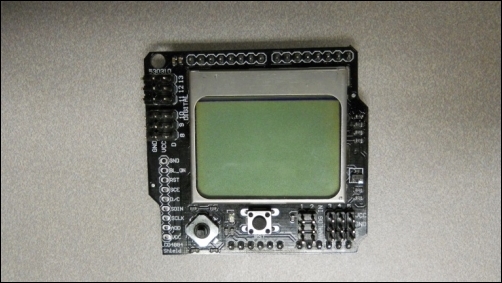An LCD shield
There is yet another option available to add a display to your projects. The unique part of this solution is that this shield will connect directly to your Arduino, making it a single hardware unit. The concept of a shield is a hardware capability that connects directly into an Arduino board at the header pins available. Connecting this unit is as simple as pressing its connections into the connections on your Arduino. The other nice characteristic of this display is that it comes with a joystick for user input. This unit is available from Amazon.com or other online retailers. The following image shows an LCD shield:

The following image shows a side view of the shield installed into an Arduino board:

Note how the connections on the shield exactly match the proper pins on Arduino. Now that the HW is connected, you can add some code to access the functionality of the shield. Plug your Arduino into the USB cable and the USB cable into the computer. The shield should light up and...

























































